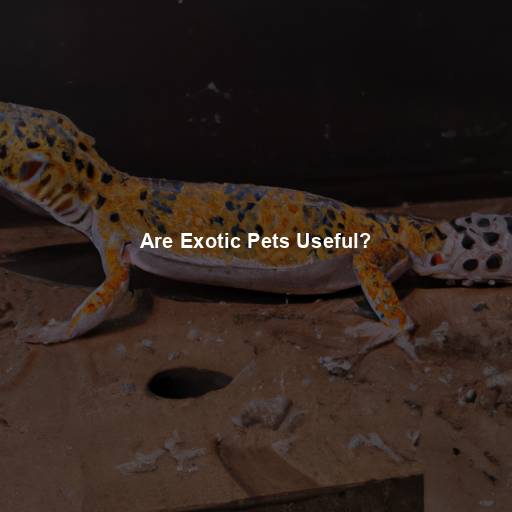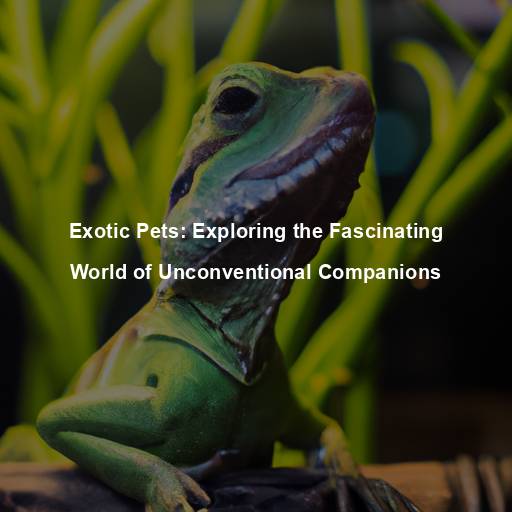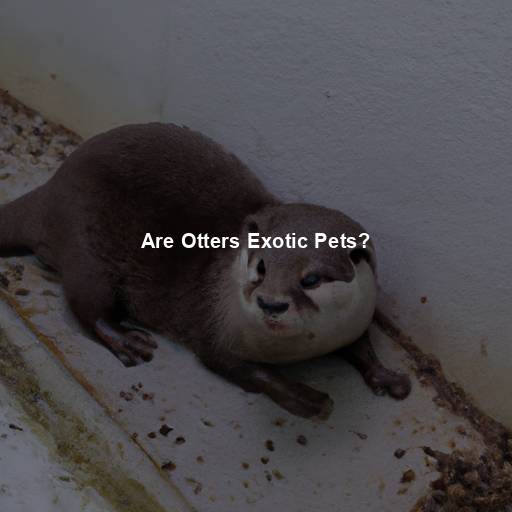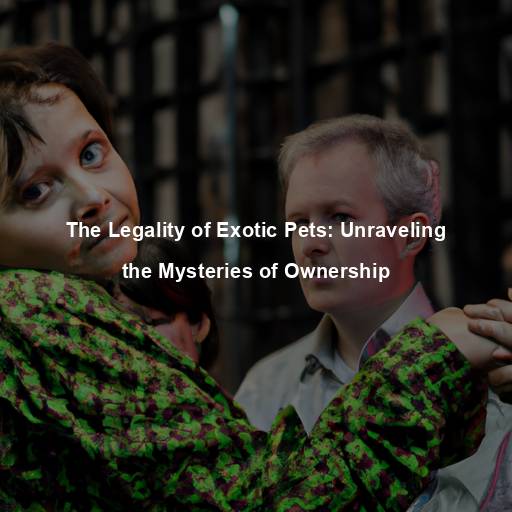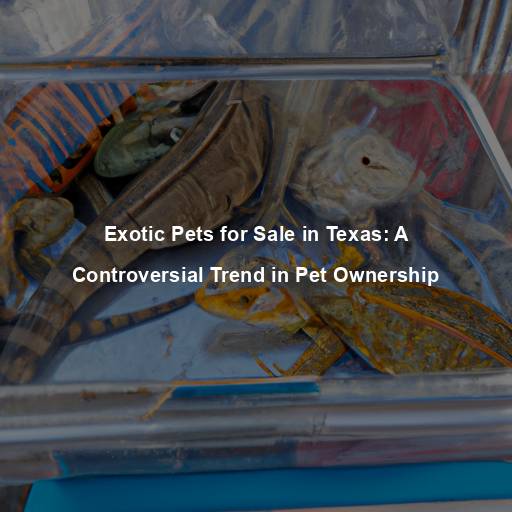Are Exotic Pets Useful?
Last Updated on October 18, 2023 by Evan
Contents [hide]
- 1 The Fascination with Exotic Pets
- 1.1 The Appeal of Unconventionality
- 1.2 Educational Value
- 1.3 Emotional Connection
- 1.4 Conservation Efforts
- 1.5 Ethical Considerations
- 1.6 Legal and Safety Concerns
- 1.7 Responsible Ownership
- 1.8 The Need for Balance
- 1.9 Health and Zoonotic Disease Risks
- 1.10 Environmental Impact
- 1.11 Responsible Breeding and Conservation
- 1.12 Exotic Pets and Public Safety
- 1.13 Alternatives to Exotic Pets
- 1.14 The Importance of Education and Awareness
- 1.15 Balancing Personal Desires and Animal Welfare
- 1.16 Ecological Disruption
- 1.17 Invasive Species
- 1.18 Disease Transmission
- 1.19 Habitat Destruction
- 2 The Emotional Connection with Exotic Pets
- 3 Responsible Ownership and Ethical Considerations
- 4 Striking a Balance
- 5 FAQs: Are Exotic Pets Useful?
- 5.1 Are exotic pets useful for any specific purpose?
- 5.2 Do exotic pets have any benefits for their owners?
- 5.3 Are there any drawbacks to owning exotic pets?
- 5.4 Can exotic pets pose any risks or dangers?
- 5.5 Is it ethical to own exotic pets?
- 5.6 What exotic pets are generally considered legal to own?
- 5.7 Are exotic pets suitable for everyone?
The Fascination with Exotic Pets
There has always been a magnetic pull between humans and exotic pets, turning heads with their one-of-a-kind charm and captivating features. The resplendent patterns of a regal Bengal tiger or the vibrant plumage of a macaw have never failed to ignite our fascination and awaken our inquisitiveness. However, underneath their stunning exteriors, one cannot help but wonder: do these extraordinary companions bring any tangible value to our existence? Are they more than mere symbols of affluence or indulgences of the peculiar?
The Appeal of Unconventionality
There’s an undeniable allure in the world of exotic pets. It’s the craving to embrace the extraordinary, to defy the norm. Although our feline and canine friends undoubtedly hold a special place in our hearts, there’s an irresistible draw towards owning a creature that resides outside the realm of ordinary. Exotic pets promise a taste of adventure, a peculiar opportunity to bring the untamed into the comforting sanctuary of our homes.
Educational Value
Exotic pets can also provide invaluable educational opportunities. By living with a unique species, owners can learn about their natural habitats, behaviors, and specific care requirements. This firsthand experience fosters a deeper understanding and appreciation for the diversity of life on our planet. It can also serve as a catalyst for discussions on conservation and the importance of protecting endangered species.
Emotional Connection
Contrary to popular belief, exotic pets are not devoid of the ability to form emotional bonds with their owners. While the nature of these bonds may differ from those formed with traditional pets, such as dogs and cats, they can still be significant and meaningful. Exotic pets can provide companionship, reduce stress, and offer a sense of purpose and responsibility.
Conservation Efforts
There’s a hot debate in the world of exotic pet enthusiasts. They argue that having these unique creatures could actually play a part in conservation efforts. How, you ask? Well, by responsibly buying legally obtained and ethically bred exotic pets, individuals believe they are giving a much-needed boost to conservation organizations and putting a dent in the illegal wildlife trade.
Ethical Considerations
The topic of exotic pets sparks a heated controversy, leaving us perplexed by the ethical quandaries that surround it. These magnificent creatures possess unique dietary and environmental requirements that might prove to be arduous to satisfy in a home setting. As a result, their well-being and health often become compromised, leaving us feeling conflicted about their captivity. Moreover, the desire for these extraordinary animals fuels the illegal wildlife trade, a distressing practice rooted in the capture and trafficking of endangered species, further adding to the complexity of the issue.
Legal and Safety Concerns
When it comes to owning exotic pets, there’s an intricate web of legal and safety concerns that one must untangle. The rules and regulations governing exotic animal ownership are far from uniform, making it a perplexing journey to navigate the labyrinth of permits and licenses. Moreover, we must not overlook the potential dangers posed by certain exotic pets, especially those with a penchant for being fierce. Mishandling or inadequate containment could result in a worrisome threat to public safety.
Responsible Ownership
When it comes to embracing the allure of exotic pets, the path to success is paved with conscientious ownership. Prospective owners must delve into the intricate details of their desired species, meticulously examining their requirements and pondering whether their own circumstances can accommodate them. The paramount importance of procuring these unique creatures from reliable breeders or compassionate rescue organizations cannot be overstated, for it ensures the well-being and happiness of these captivating animals.
The Need for Balance
In the grand tapestry of discussions surrounding exotic pets, one must navigate through the labyrinthine paths of diverse viewpoints and considerations. Like a kaleidoscope of perspectives, these creatures offer a multidimensional experience that is both captivating and confounding. While their educational potential and emotional allure leave an indelible mark on our hearts, the ethical and safety dilemmas they raise persistently challenge our convictions. Indeed, it is a precarious tightrope to walk, where responsible ownership and an unwavering commitment to understanding the intricacies of these remarkable beings become crucial threads in the fabric of our coexistence.
This essay is intended to provide an overview of the topic and does not constitute professional advice. It is important to consult with experts and professionals before making decisions regarding exotic pet ownership.## The Debate on Exotic Pet Ownership
Health and Zoonotic Disease Risks
When it comes to the captivating world of exotic pet ownership, a topic that often tiptoes through the minds of many is the perplexing matter of health risks. Zoonotic diseases, which encompass a range of illnesses that can jump from animals to humans, cast a shadow of concern in this realm. The idea that these fascinating creatures, particularly those snatched from their wild habitats, may harbor parasites, bacteria, or viruses that pose a threat to human well-being leaves us breathless with apprehension. However, fear not, for with proper hygiene practices, regular veterinary check-ups, and skillful handling techniques, we can unravel the enigma of reducing these potential risks.
Environmental Impact
The environmental impact of exotic pet ownership is another aspect that deserves attention. Some exotic pets, such as certain reptiles or birds, may require specific environmental conditions that can be challenging or impossible to replicate in a home setting. This can lead to the depletion of natural resources, such as water or energy, in an attempt to create suitable habitats. Additionally, the release of exotic pets into non-native environments can have detrimental effects on local ecosystems.
Responsible Breeding and Conservation
As we navigate the complex landscape of the illegal wildlife trade, it becomes evident that responsible breeding and captive conservation programs offer a glimmer of hope amidst the perplexing challenges we face. These programs tirelessly strive to safeguard endangered species by nurturing genetically diverse populations and facilitating their return to the wild. It is with unwavering support for reputable breeders and conservation organizations that exotic pet owners can truly make a meaningful impact in this ever-evolving effort.
Exotic Pets and Public Safety
When we delve into the subject of exotic pet ownership, it becomes paramount to address the critical matter of public safety. It is impossible to downplay the potential dangers associated with certain exotic animals, particularly formidable predators. The grave risks they pose to owners and even the unsuspecting public cannot be emphasized enough, especially when inadequate housing and handling are involved. In light of numerous incidents involving escapes or perilous attacks, the urgent call for stringent regulations and responsible ownership practices cannot be brushed aside.
Alternatives to Exotic Pets
There’s something undeniably captivating about exotic animals – their allure is hard to resist. But for those who prefer not to keep these magnificent creatures as pets, worry not! There are plenty of alternative ways to immerse yourself in their world. Pay a visit to accredited zoos, wildlife sanctuaries, or conservation centers, where you can observe these remarkable species in a controlled and educational environment.
The Importance of Education and Awareness
In a world where passion meets responsibility, one cannot underestimate the importance of education and awareness when it comes to exploring the exotic realm of pet ownership. As potential companions dance on the edges of our curiosity, it becomes imperative that we embark on a journey of knowledge, unearthing the intricate needs and peculiar requirements of these captivating creatures before plunging into a decision. Only through understanding the profound commitment and abundant resources required can we truly safeguard the welfare and ensure the enduring existence of our beloved exotic pets.
Balancing Personal Desires and Animal Welfare
Owning an exotic pet is no casual endeavor. It demands thoughtful deliberation, as one navigates the labyrinth of risk, ethical quandaries, and the responsibility to provide an optimal habitat for these creatures. Above all, we must cast aside our personal desires, valuing the welfare and preservation of these species over our whims, and make conscientious decisions that uphold the principles of responsible ownership.
Ecological Disruption
One of the significant concerns related to exotic pet ownership is the potential impact on native wildlife. Exotic pets that are released or escape into the wild can disrupt local ecosystems by outcompeting native species for resources or preying on them. These introduced species may lack natural predators or diseases, allowing their populations to grow rapidly and negatively affect the balance of the ecosystem.
Invasive Species
The presence of exotic pets outside their original habitat can cause a great deal of trouble for the delicate balance of nature. Once these creatures find a new home and start multiplying without control, the consequences can be disastrous for the local ecosystem. The invasive species not only disrupt the natural order but also pose a serious challenge to the native plants and animals, ultimately putting them at risk of disappearing forever. The competition for limited resources like food, shelter, and breeding grounds further exacerbates the situation, leaving the fate of the indigenous wildlife hanging in uncertainty.
Disease Transmission
The allure of exotic pets can be enticing, but it’s important to consider the potential consequences of introducing new diseases to native wildlife. These unfamiliar illnesses can wreak havoc on vulnerable species who may not have the necessary safeguards in place. As a result, the presence of exotic pets in our environment can trigger a cascade of events, unleashing destructive diseases that throw off the delicate balance of our ecosystems.
Habitat Destruction
The demand for exotic pets can also contribute to habitat destruction in source countries. In some cases, the capture and trade of exotic animals involve destructive practices such as illegal logging, habitat degradation, and wildlife trafficking. These activities not only harm the animals themselves but also have far-reaching consequences for the delicate ecosystems they inhabit.
The Emotional Connection with Exotic Pets
Unique Bonds
The bond between humans and exotic pets is a fascinating and enigmatic one, brimming with both curiosity and perplexity. Though divergent from the relationship we share with our more conventional furry friends, the emotional connection that flourishes between exotic pet owners and their extraordinary companions is nothing short of extraordinary. It is within this realm of the extraordinary where a tapestry of trust and understanding is woven, birthing a profound connection that defies traditional norms. In this realm, joy, companionship, and a deep sense of fulfillment permeate the lives of both the keeper and the kept, leaving all who witness it in a state of awe and wonder.
Unconventional Companionship
Step into a vibrant world of fascinating companionship that defies the ordinary. Exotic pets enchant with their enigmatic behaviors, captivating souls who dare to delve into their captivating realm. Delight in the quizzical allure of their personalities, unveiling mysteries that beckon exploration. Embrace the bewilderment as you enter a realm where instinctive nuances intertwine with astonishing interactions, forever leaving you captivated.
Therapeutic Benefits
Studies have shown that interactions with animals, including exotic pets, can have therapeutic benefits for humans. Spending time with these unique creatures can reduce stress, improve mood, and enhance overall well-being. The presence of an exotic pet can provide comfort and emotional support, especially for individuals facing challenges or dealing with mental health issues.
Responsible Ownership and Ethical Considerations
Educating Potential Owners
To ensure the responsible ownership of exotic pets, it is crucial to educate potential owners about the specific requirements and challenges associated with caring for these animals. This education should include information about their dietary needs, housing requirements, socialization, and potential health issues. By providing comprehensive education, individuals can make informed decisions and better understand the responsibilities involved in owning an exotic pet.
Adoption and Rescue Efforts
Supporting adoption and rescue organizations that specialize in exotic animals is another way to promote responsible ownership. These organizations provide a safe haven for animals that have been abandoned, surrendered, or confiscated. By adopting from these organizations, individuals can provide a second chance for animals in need and contribute to the conservation of exotic species.
Encouraging Conservation Efforts
Did you know that responsible exotic pet owners have the power to make a significant impact on conservation efforts? It’s true! Whether it’s lending a helping hand to conservation organizations through financial support, giving their time and resources as volunteers, or even joining awareness campaigns, these individuals are playing a vital role in protecting and preserving endangered species and their habitats. Their involvement not only raises awareness about the urgent need for conservation but also inspires others to take action towards a brighter and more sustainable future for our planet.
Striking a Balance
Owning exotic pets may seem like a wild adventure full of excitement and knowledge waiting to be discovered. But hang on just a second! We need to find the perfect equilibrium between our awe for these creatures and the conservation of their natural habitats. It’s our duty to approach this intriguing realm with caution, conducting extensive research, and backing conservation initiatives.
This essay is intended to provide an overview of the topic and does not constitute professional advice. It is important to consult with experts and professionals before making decisions regarding exotic pet ownership.
FAQs: Are Exotic Pets Useful?
Are exotic pets useful for any specific purpose?
The world of exotic pets is a captivating and diverse realm, offering surprising and unexpected benefits for those who dare to delve into its depths. These extraordinary creatures, be they magnificent reptiles or enchanting avian wonders, have the power to not only educate, but to mesmerize and captivate all who encounter them. From their exquisite features to their intriguing behaviors, these non-traditional companions have the ability to engage our senses and stir our imagination. Furthermore, let us not forget the unsung heroes of the exotic pet world – the cunning ferrets and resourceful rodents – whose presence can bring relief from the relentless onslaught of pests that invade our homes and plunder our crops.
Do exotic pets have any benefits for their owners?
Owning an exotic pet can offer several benefits for their owners. They can provide a sense of companionship and offer emotional support, especially for those who may be living alone or have specific needs. Some exotic pets, like dogs, can also play a role in enhancing physical health by encouraging regular exercise and outdoor activities such as walking or playing fetch. Furthermore, caring for an exotic pet can teach responsibility, empathy, and patience in individuals, fostering personal growth and character development.
Are there any drawbacks to owning exotic pets?
While there can be benefits, owning exotic pets also has its drawbacks. Exotic pets often have specialized care requirements, which can be time-consuming and expensive. Finding knowledgeable veterinarians who specialize in exotic animals can also be more challenging than for traditional pets. Additionally, some exotic pets may require permits or licenses to own legally, adding a layer of complexity to the ownership process. It is crucial to research and understand the specific needs and legalities associated with owning an exotic pet before making a decision.
Can exotic pets pose any risks or dangers?
Keeping exotic pets can come with a whirlpool of uncertainties and enigmas. These extraordinary creatures have the potential to harbor diseases that are transmissible to humans, highlighting the significance of meticulous hygiene and routine health evaluations for both the pet and its owner. Furthermore, some exotic animals display temperamental tendencies or demand specialized handling, presenting an imminent safety hazard to unseasoned or untrained individuals. It is crucial to embark on a profound quest for knowledge about the specific species, including their idiosyncratic behaviors and potential risks, in order to safeguard the well-being of both the human caretaker and their exotic companion.
Is it ethical to own exotic pets?
The question of ethical ownership of exotic pets is subjective and open to debate. Some argue that it is unethical to keep animals in captivity for human purposes, as it restricts their natural behavior and habitat. Others believe that responsible ownership and proper care can provide a safe and enriching life for exotic pets. The ethical aspect depends on factors such as the source of the animal, its specific care requirements, and whether it contributes to the conservation of the species. It is important to research, consider, and follow relevant guidelines and regulations to ensure the ethical treatment of exotic pets.
What exotic pets are generally considered legal to own?
The legality of owning exotic pets varies greatly depending on the jurisdiction and specific regulations. While some countries allow a wide range of exotic pets, others have strict restrictions or even bans on certain species. Common exotic pets that are often legal to own include reptiles like bearded dragons or geckos, small exotic mammals like sugar gliders or hedgehogs, and certain species of birds like parrots or cockatiels. However, it is crucial to check local laws and regulations to ensure compliance and avoid potential legal issues.
Are exotic pets suitable for everyone?
Exotic pets are not suitable for everyone. They require specialized care, attention, and resources that may not be feasible for some individuals or households. Factors such as lifestyle, available space, financial capabilities, and sufficient knowledge and commitment play crucial roles in determining whether someone is well-suited to own an exotic pet. It is essential to honestly assess one’s capabilities and thoroughly research the specific needs of the desired exotic pet before making a decision.

